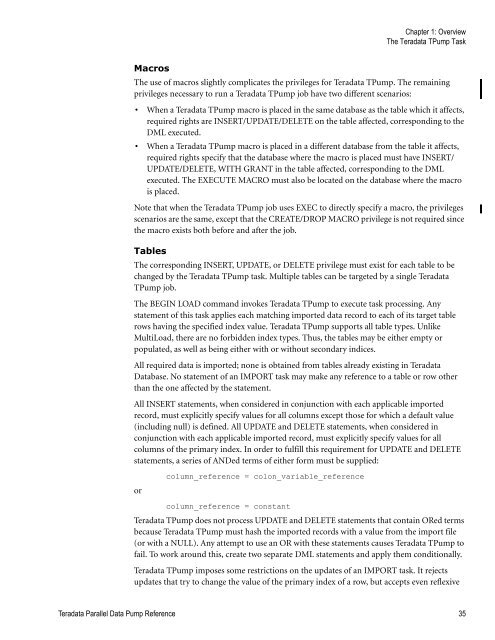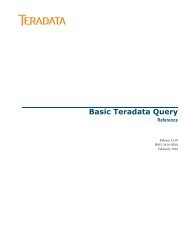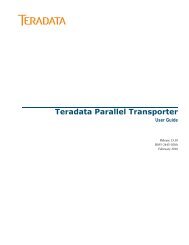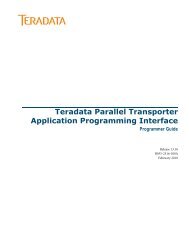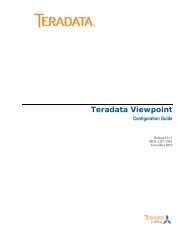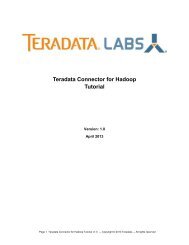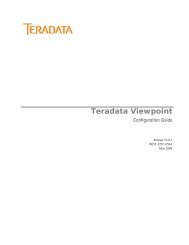Teradata Parallel Data Pump
Teradata Parallel Data Pump Reference - Teradata Developer ...
Teradata Parallel Data Pump Reference - Teradata Developer ...
- No tags were found...
Create successful ePaper yourself
Turn your PDF publications into a flip-book with our unique Google optimized e-Paper software.
Chapter 1: Overview<br />
The <strong>Teradata</strong> T<strong>Pump</strong> Task<br />
Macros<br />
The use of macros slightly complicates the privileges for <strong>Teradata</strong> T<strong>Pump</strong>. The remaining<br />
privileges necessary to run a <strong>Teradata</strong> T<strong>Pump</strong> job have two different scenarios:<br />
• When a <strong>Teradata</strong> T<strong>Pump</strong> macro is placed in the same database as the table which it affects,<br />
required rights are INSERT/UPDATE/DELETE on the table affected, corresponding to the<br />
DML executed.<br />
• When a <strong>Teradata</strong> T<strong>Pump</strong> macro is placed in a different database from the table it affects,<br />
required rights specify that the database where the macro is placed must have INSERT/<br />
UPDATE/DELETE, WITH GRANT in the table affected, corresponding to the DML<br />
executed. The EXECUTE MACRO must also be located on the database where the macro<br />
is placed.<br />
Note that when the <strong>Teradata</strong> T<strong>Pump</strong> job uses EXEC to directly specify a macro, the privileges<br />
scenarios are the same, except that the CREATE/DROP MACRO privilege is not required since<br />
the macro exists both before and after the job.<br />
Tables<br />
The corresponding INSERT, UPDATE, or DELETE privilege must exist for each table to be<br />
changed by the <strong>Teradata</strong> T<strong>Pump</strong> task. Multiple tables can be targeted by a single <strong>Teradata</strong><br />
T<strong>Pump</strong> job.<br />
The BEGIN LOAD command invokes <strong>Teradata</strong> T<strong>Pump</strong> to execute task processing. Any<br />
statement of this task applies each matching imported data record to each of its target table<br />
rows having the specified index value. <strong>Teradata</strong> T<strong>Pump</strong> supports all table types. Unlike<br />
MultiLoad, there are no forbidden index types. Thus, the tables may be either empty or<br />
populated, as well as being either with or without secondary indices.<br />
All required data is imported; none is obtained from tables already existing in <strong>Teradata</strong><br />
<strong>Data</strong>base. No statement of an IMPORT task may make any reference to a table or row other<br />
than the one affected by the statement.<br />
All INSERT statements, when considered in conjunction with each applicable imported<br />
record, must explicitly specify values for all columns except those for which a default value<br />
(including null) is defined. All UPDATE and DELETE statements, when considered in<br />
conjunction with each applicable imported record, must explicitly specify values for all<br />
columns of the primary index. In order to fulfill this requirement for UPDATE and DELETE<br />
statements, a series of ANDed terms of either form must be supplied:<br />
or<br />
column_reference = colon_variable_reference<br />
column_reference = constant<br />
<strong>Teradata</strong> T<strong>Pump</strong> does not process UPDATE and DELETE statements that contain ORed terms<br />
because <strong>Teradata</strong> T<strong>Pump</strong> must hash the imported records with a value from the import file<br />
(or with a NULL). Any attempt to use an OR with these statements causes <strong>Teradata</strong> T<strong>Pump</strong> to<br />
fail. To work around this, create two separate DML statements and apply them conditionally.<br />
<strong>Teradata</strong> T<strong>Pump</strong> imposes some restrictions on the updates of an IMPORT task. It rejects<br />
updates that try to change the value of the primary index of a row, but accepts even reflexive<br />
<strong>Teradata</strong> <strong>Parallel</strong> <strong>Data</strong> <strong>Pump</strong> Reference 35


